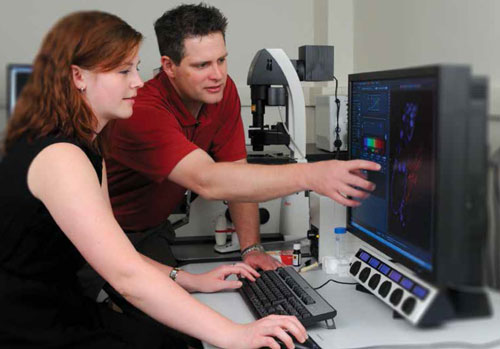
Biology Professor Scott Ferguson was awarded a $250,000 grant from the National Science Foundation (NSF) to assess how humans develop and are affected by disease. It’s also allowing Molecular Genetics students like Danielle Hindes, a junior, to gain Ph.D.-level research experience.
This past spring, Biology Professor Scott Ferguson was awarded a $250,000 Research in Undergraduate Institutions grant from the National Science Foundation (NSF). The funding allows him to conduct a three-year research project, “Genetic Analysis of Gurken Translational Control in Drosophila,” that has the potential to assess how humans develop and are affected by disease.
The largest award ever earned by a SUNY Fredonia biology faculty member, the grant will substantially increase the capacity for campus research activities and create extraordinary learning opportunities for students.
Key elements of the grant include: a research collaboration with Roswell Park Cancer Institute for whole-genome DNA sequencing and bioinformatics analysis; acquisition of new research instrumentation and materials to study gene expression in biological specimens; annual support for three students to perform summer research on campus; and travel expenses for Dr. Ferguson and his students to attend national research conferences.
Ferguson, who holds a doctorate in genetics and gene regulation from the University of Pennsylvania School of Medicine, utilizes fruit flies as a model system to understand how, when and where genes get turned on and off during development and in response to environmental stimuli.
“The signaling processes that I study in the fly are nearly identical to those found in humans,” Ferguson said. “In fact, 75 percent of human disease genes have a functional analogue in flies which makes them an excellent system where we can make inroads into our understanding of human biology.”
The main goal of the project is to understand the genetic and environmental signals that control how normal development occurs and explain what causes things to go wrong. All of the diversity of cell types and tissues in the body is controlled by genes being turned on and off in a specific way that is appropriate for their given context, Ferguson explained.
“We are studying the detailed molecular switches that control production of a growth factor, the human homologue of which is inappropriately turned on in numerous forms of cancer,” he added. “The production of this protein – called Gurken in flies, and Transforming Growth Factor Alpha in humans – is tightly controlled and only permitted in certain corners of some cells at specific times during their lives. The hope is that, by understanding the regulatory mechanisms that bring about this carefully orchestrated expression, we can identify novel treatments for diseases where this control has broken down.”
Students will be in an enviable position to benefit from Ferguson’s research activities.
“This grant will enable Dr. Ferguson to offer incredible research-based opportunities to students,” said Patricia Astry, chair of the Department of Biology. “The scale of research that our students will be doing is directly comparable to research done by graduate students at Ph.D.-granting universities. It will make them considerably more competitive applicants for graduate or medical school.”
“Dr. Ferguson’s grant is a wonderful accomplishment,” added John Kijinski, dean of Fredonia’s College of Liberal Arts and Sciences. “The work that results from this grant will be important in adding to our knowledge of how diseases are related to genetic codes. Furthermore, it will allow students in our biology program to be part of an important research effort. A significant feature of our science departments is that they offer our undergraduates access to first-rate research opportunities.”
One of those students is Danielle Hindes, a junior Molecular Genetics major from Rensselaer, N.Y., and an officer in SUNY Fredonia’s chapter of the National Biological Honor Society (Beta Beta Beta).
“That I’ve been given a great opportunity to work in a research lab with such high-level resources at a smaller university is unusual,” said Ms. Hindes. “I’m thrilled for the innumerable prospects that this grant has and will give.”
Each summer, the grant will fund individual $4,000 stipends for three students to be engaged in full-time research with Ferguson. The students will be intimately involved in the design and execution of the experiments and have the opportunity to present the results at regional and national meetings. The research will directly impact not only the students working in Ferguson’s laboratory, but also those enrolled in his lab courses.
“I strive to blur the lines between research and teaching by bringing my scholarship into the genetics and molecular genetics lab courses,” said Ferguson, who directs the Molecular Genetics program at SUNY Fredonia. “By providing all of our students with a bona fide research experience in the core curriculum, we are ensuring that they graduate with real-world analytical skills that they can apply following graduation.”
The grant also enabled Ferguson and three students – Jacob Merle, a master’s degree candidate in Biology; and Nancy Levensailor and Hindes, both Molecular Genetics juniors – to attend the 54th annual Genetics Society of America Drosophila Research Conference in Washington, D.C., this past April. Attendance at future national conferences will also be supported.
NSF grants have become highly competitive recently, with only four out of 35 applications in the Molecular and Cellular Biosciences division gaining approval in the most recent cycle, said Ferguson, who recalls acceptance rates closer to one-in-three when he was a graduate student. He received internal grants and scholarly incentive awards from SUNY Fredonia to assemble data in support of his NSF application.
“The commitment to supporting innovative research programs has made Fredonia a vibrant environment for students and faculty to thrive together as scholars,” Ferguson added. “This grant recognizes Fredonia as a destination where students receive world-class training in the sciences.”
Photo cutline:
# # #



